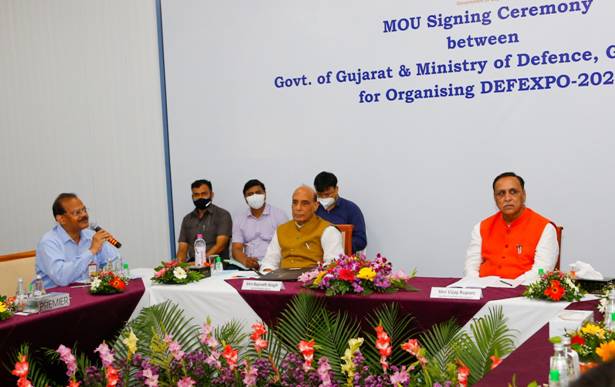
New Delhi: Even as the air is to clear over the holding of the 12th edition of DefExpo 2022 in Gandhinagar, Gujarat which is to be inaugurated by Prime Minister Narendra Modi, participants at a Webinar felt that “self-reliance was the cornerstone of India’s defence production.”
Participating in a Webinar on “Opportunities and Way Ahead for India’s role in Global Defence Manufacturing,” ahead of the DefExpo 2022 organized by the Society of Indian Defence Manufacturers (SIDM), it was felt that “much has been achieved though much more needs to be done and for this strategic partnership is very important.”
Initiating the discussion, S P Shukla, President of SIDM, said, the industry was ready to move to a level of higher global share in the defence sector and boost capability to the next level. He said there is large opportunity for defence production in the domestic sector of about Rs 1,75,000 crore and meet the target of $ 25 million in domestic defence production.
Expressing optimism, Anurag Bajpai, Joint Secretary, Department of Defence Production in the Defence Ministry, said the DefExpo would exhibit India’s prowess with the country “emerging as a global defence manufacturing hub and creating a level playing field for the private sector.”
Confident that India would emerge in the top position with self-reliance as the cornerstone of India’s defence production policy, he said “with the support from 15 defence public sector undertakings and over 16,000 MSMEs, the country would have a strong defence industry eco-system and coupled with this over 550 licenses have been issued to defence industry.”
In his address, Mohammed Noor Rehman, Joint Secretary in the Ministry of External Affairs said Indian defence industry is at a crucial juncture and has become a vibrant eco-system and all types of military platforms and global demand have become dominant in the last ten to fifteen years.
“Much has been achieved and much more needs to be done to become self-reliant and for this strategic partnership is very important,” Rehman said adding that “defence export has become an important component of our policy.”
Participating in the webinar, former diplomat Vishnu Prakash said that India had been heavily dependent on imported platforms for defence and the biggest buyer of arms which was worn as “ a badge of honour.” However, now India having finalized a deal with the Philippines for the sale of BRAHMOS missile, defence presents its role in diplomacy and it is good to build relations.
Another major achievement was that the Russian President Vladimir Putin left Russia only for the second time to come to India and sign an agreement which “showed the trust and confidence in our leadership,” Prakash said.
He suggested the Defence Ministry set up an Empowered Import Protection Cell upgraded with other ministries to study the requirements of the world and make recommendations to give an edge to the country’s exports.
“The journey ahead in this would be complex but it would be rewarding,” Prakash said.
Stating that Indian industry has accepted new challenges successfully, Cmde (Retd) Siddharth Mishra, CMD of defence PSU, Bharat Dynamics Ltd (BDL) said the government’s Atmanirbhar Bharat or self-reliance has facilitated the Indian Industry to grow.
The encouragement to startups has led to new initiatives and made young entrepreneurs suppliers and partners, he said.
Speaking at the Webinar, Ashish Saraf, Vice President and Country Director of Thales, said that the company which has been in India since 1953 is extremely supportive of Atmanirbhar and “we are confident that the DefExpo will be a mega success and India would be growing in terms of self-reliance.”
Thales in partnership with Bharat Electronics Ltd (BEL) has been manufacturing radars which are being exported to Netherlands. A team of 74 suppliers are cumulatively bringing US$ 0.5 billion and would be doubling it in the next five years touching $1 billion, he said.
Saraf said as part of Transfer of Technology (TOT), Thales with Bharat Dynamics Limited (BDL)- part of the Global Supply Chain has taken the first step towards manufacture of Guided Laser Missile for export to UK though primarily it would be manufactured for India.
Dr Sanjeev Kumar Joshi, Deputy CEO, BrahMos Aerospace, participating in the webinar, stressed that technology has grown so “continuous upgradation of technology is needed” and as imperative for growth, testing of indigenous technology was important.








